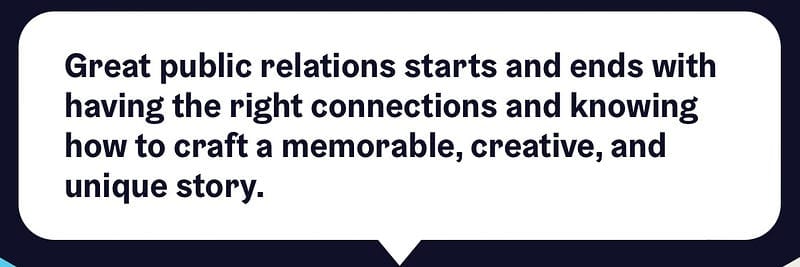The myth of media relations
he homogeneity of yesteryear has been replaced — but some things don’t change

The thing I love about today’s PR + Comms industry is that the homogeneity of yesteryear has been replaced by a whole array of different vivid approaches.
It feels like the game used to be: “we are gatekeepers to the media, they won’t listen to you without us.” This is a pitch that makes no sense given there was a vast landscape of media relations agencies in existence, but… whatever.
Today, I feel that there’s a greater variety of ways in which to generate positive PR, especially as you hone in on different niches and audiences. That means different agency founders offer vastly different options – which means you are more likely to find the best fit for your particular needs.
But.
Which all brings me to the snapshot above – it’s the perfect encapsulation of what I believe is one of PR’s big myths: that it’s all about who you know, and nobody will listen to you without your special PR friend getting a foot in the door.
Different perspectives between agencies are good. But this is something different. It’s pretending that old heritage of exclusivity and scarcity still exists.
This becomes even more ridiculous if you break it down:
- Ultimately, your story is either: A) interesting and relevant or B) not.
- In scenario A, your story was good anyway – and so the role of the PR is a glorified email monkey
- In scenario B, your story wasn’t actually relevant, and yet somehow the PR is making them write something up anyway.
Now, aside from the fact that the journalists I know are incredibly unlikely to do this, there’s a bigger problem. Brute-forcing the challenge in this way would hide from a more important fact: your story sucks!
What are you really adding?
If you focus directly on ADDING VALUE, I don’t believe the most common area PR achieves this is by becoming buddies with journalists. It’s by helping a team sculpt the bigger PoV, frame and narrative that will run across all their stories.
This makes it easier to get attention across the board. Yes, with journalists, but more importantly also with prospects and existing customers.
The real win
Returning to the topic of media, here’s what I think the real benefit is – and the better argument I see for saying close connections are really important.
Familiarity in a relationship is good – not because the relationship itself gives you an advantage, but because it means you learn how to be as helpful as possible and collaborate effectively.
Is is also this real skill that helps when every agency eventually has to kickstart relationships with new journalists, new contacts, new subject areas. If connections were truly the “start and end”, then their value would disappear every time they encounter a new contact. Of course it doesn’t.
It’s time to put this kind of nonsense to bed and focus on the real value.
Do better
Ironically, I think the phrasing above is not “memorable, creative and unique”. But the good news is, I don’t believe your agency proposition necessarily has to be.
The real value the best agencies provide is not supplying the absolute basics you might expect. It’s in being the strongest possible fit for your team, such that you can actually execute and collaborate on the best possible work together.
By all means let them take you for lunch with a journalist, but don’t lose sight of the real prize on offer if you can communicate your business’s strength accurately.
You can be telling the story, instead of relying on others to do it for you.

